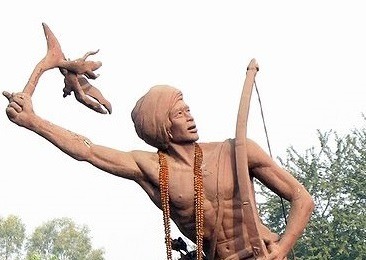Legacy of Bhagwan Birsa Munda
Remembering Dharti Aba Bhagwan Birsa Munda on His Death Anniversary (June 9, 1900)
CURRENT AFFAIRSARTICLE
6/9/20232 min read


Birsa Munda’s life is a tale of bravery, resilience and unwavering commitment to his tribe. He was an activist for the rights and welfare of the tribal people, fighting against the oppressive British colonial rule and the exploitative practices of the local landlords.
Birsa Munda was born on November 15, 1875 into a Munda tribal family in Ulihatu village, in Ranchi district of Bengal Presidency (at present - Khoonti district, Jharkhand). Since childhood, he observed their lands were taken away and various forms of the exploitation and oppression were being faced by his people at the hands of the British colonial authorities and the local landlords. Witnessing the injustices faced by his people, Birsa became determined to fight for their rights and dignity.
In his teenage years, Birsa Munda organized his fellow tribal and led movements to address issues such as land alienation, forced labor, and cultural erosion. He worked tirelessly to protect the traditions and customs of his community. His leadership quickly gained respect among the tribal people. His ability to mobilize and motivate the masses made him a prominent figure in the tribal rights movement. He called for unity and urged the tribes to come together to fight against the oppressive policies of the British administration.
In 1895, Birsa Munda founded “Ulgulan” which means “revolt” or “uprising”. The rebellion aimed to reclaim the tribal lands, abolish the exploitative practices and establish self-governance. Birsa and his followers launched a guerrilla style resistance, attacking the symbols of Bitish authority, such as police stations and government buildings. The rebellion shook the British administration and inspired many others to join the struggle. The Ulgulan movement became a symbol of resistance against the British rule and the injustices faced by the tribal communities. The British authorities responded with brutal force, leading to numerous casualties among the tribal fighters.
In 1900, Birsa Munda was captured by the British forces and charged with sedition. He was imprisoned in Hazaibagh Jail, where he continued to inspire his fellow prisoners with his unwavering spirit. Unfortunately, his health deteriorated rapidly in prison, and he passed away on June 9, 1900.
Birsa Munda’s impact on the tribal rights movement was immense. His struggle became a source of inspiration for future generations of freedom fighters and social activists in India. Post-independence, Birsa Munda’s contributions were recognized and he was hailed as a national hero and a champion of the marginalized. His birth anniversary, 15th November,is celebrated as “Birsa Munda Jayanti” in Jharkhand and other parts of India. Indian government announced to celebrate his birthday as “Janjatiya Gaurav Divas” since 15th November 2021.
Numerous institutions, statues and memorials have been dedicated to honouring his memory and the ideals he fought for. Jharkhand government launched various schemes in his name. e.g. Birsa Harit Gram Yojna, Birsa Munda Technical Scholarship Scheme, Birsa Munda Bagwani Yojna, Bhagwan Birsa Munda Swarojgar Yojan, Samekit Birsa Gram Sah Krishak Pathshala, Birsa Sinchai Koop Samvardhan Yojna, Birsa Awas Yojna etc.
Ranchi’s Airport is named after him as “Birsa Munda Airport”.
War cry of Bihar Regiment is – “ Birsa Munda Ki Jay”
World’s largest hockey stadium, Rourkela, Odisha is named as “Birsa Munda International Hockey Stadium”.
Various films are made on his life e.g. Ulugulan–Ek Kranti (2004), Birsa Munda–The Black Iron Man (2004), Gandhi Se Pehle Gandhi (2008).
Even today, Birsa Munda is considered as God among the tribal. He is called as “Dharti Aba”. Today, on his death anniversary, we pay our heartedly tribute to a national hero of India. His life and legacy serve as a reminder of the power of determination, resilience and unity in the face of adversity.
